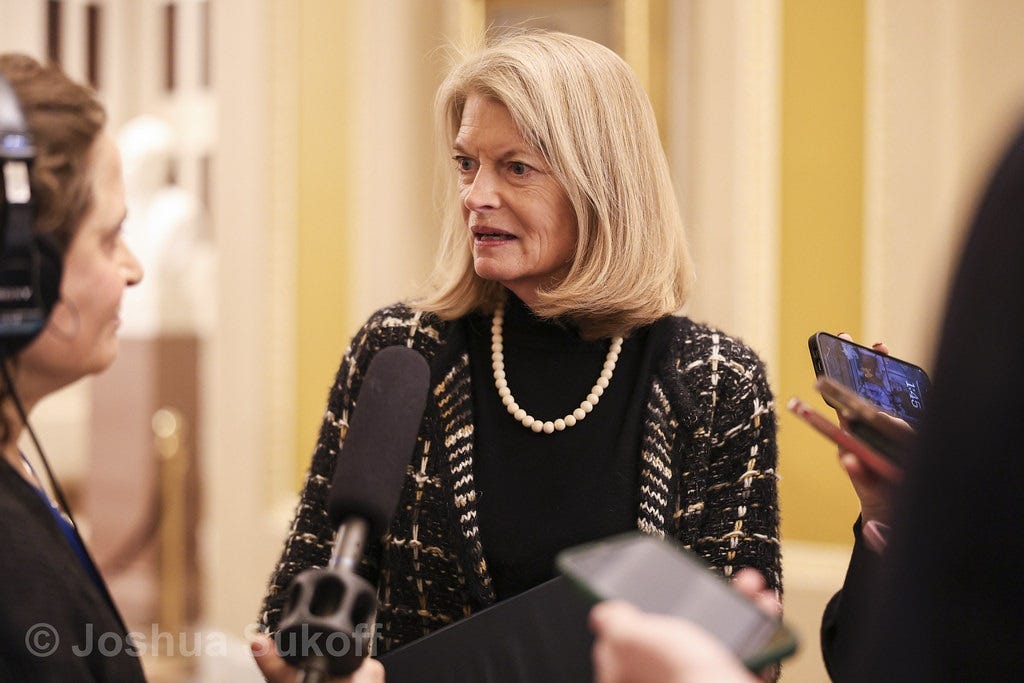Which 30 Pieces Of Silver Bought Lisa Murkowski's Vote?
Gee, she pulled the football away *again!*

Lisa Murkowski says her decision to vote for the Big Ugly Blowjobs For Billionaires Bill was “agonizing,” and that she really truly hopes that the House will fix all the many things wrong with it, so that those changes will make it necessary for the bill to come back to the Senate for another round of revisions. Murkowski explained to reporters,
Did I get everything that I wanted? Absolutely not. But did we make some changes in the SNAP provisions that will allow for a delay, that will allow for greater flexibility to the state? Absolutely. Did we get support through the Rural Health Fund? Absolutely, we were able to plus that up.
We do not have a perfect bill by any stretch of the imagination. My hope is that the House is going to look at this and recognize that we're not there yet.
I would hope that we would be able to actually do what we used to do around here, which is work back and forth between the two bodies to get a measure that's going to be better for the people in this country, and more particularly for the people of Alaska.
Frankly, she liked extending the 2017 Trump tax cuts and adding to them, so a little deal-sweetener was enough to get her on board. Kind of a bummer about those other states, but maybe the House will make things all better. House Republicans are famous for working together to make things better.
Asked about Rand Paul’s comment that the deal that brought her onboard was a “bailout” for Alaska, Murkowski just glared at NBC reporter Ryan Nobles for a good 10 seconds before answering with something similar to her other comments.
What’s In The Polar Payoff?
According to David Dayen at the American Prospect, the bill’s cuts to the Supplemental Nutrition Assistance Program (SNAP) will be tempered, a little bit, for Alaska, winning Murkowski’s state a five-year waiver from a provision that increases the percentage of SNAP benefits states must pay if they have more errors in payments than average. Since a special deal just for Alaska wouldn’t fly with the Senate parliamentarian, the deal instead gives that five-year waiver to the 10 states that currently have the highest error rates. Big surprise, Alaska is at the top of that list!
The expanded SNAP waivers mean that in the short-term only certain states with average or even below-average payment error rates will have to pay into their SNAP program; already, the language provided that states with the lowest error rates wouldn’t have to pay. “The Republicans have rewarded states that have the highest error rates in the country… just to help Alaska, which has the highest error rate,” thundered Sen. Amy Klobuchar (R-MN), offering an amendment to “strike this fiscal insanity” from the bill. The amendment failed along party lines.
Good news for poor people in 10 states with lousy accounting, but the bill still cuts SNAP and other food benefits overall. Republicans also tried to exempt Alaska from the ruinous work-reporting requirements for Medicaid that will throw millions of people off coverage, but the parliamentarian threw that out.
From Hell’s Tax Break For Whaling Captains I Stab At Thee
And yes, the bill really does include a special tax break for Native Alaskan whale hunters, allowing them to deduct $50,000 of their whaling expenses, up from the current $10,000. Probably not going to bust the budget, since the deduction is only available to folks who are “recognized as a whaling captain by the Alaska Eskimo Whaling Commission” and are “engaged in the sanctioned, subsistence hunting of bowhead whales.” Subsistence hunters in Alaska are allowed to take as many as 93 bowhead whales in 2025, but that quota is parceled out among 11 whaling villages, so the actual number of whales landed each year has ranged since the turn of this century from a high of 75 in 2001 to a low of 36 in 2019, according to the International Whaling Commission. Make your Herman Melville jokes about “whaling captain tax break,” but we aren’t talking a major deal there.
Hospital Closures From Medicaid Cuts? Rural Jurors Are Still Out.
There were a few other changes that helped Murkowski get to yes, and the best that can be said about them is that they will at least apply beyond just Alaska. For starters, the bill doubled a fund to help rural hospitals from $25 billion to $50 billion over five years, which will cushion the blow from the bill’s more than $1 trillion in Medicaid cuts the way a pea under a mattress would. Rural hospitals are still likely to close, but maybe not quite as soon as they would have in the runup to the next two general elections, assuming they’re actually held.
Industry-Killing Wind And Solar Tax Dies
The bill still murders most of the clean energy incentives in Joe Biden’s 2022 Inflation Reduction Act, but in an effort to appease Murkowski, as well as Iowa’s Chuck Grassley and Joni Ernst, a last-minute amendment removed a proposed excise tax on solar and wind projects that could have been even more devastating to renewable energy. That sloppily written provision, which would have steeply taxed wind and solar projects containing components from China starting in 2027, was suddenly jammed into the bill Friday, though nobody took credit for adding it. The tax was projected to increase the cost of wind and solar development by as much as 20 percent, and industry groups warned that could kill off investments in renewables. And because two-thirds of new energy projects in the country are wind and solar (often backed up by storage batteries), the tax also would have driven up the cost of US electricity even more than Trump’s insane energy policies already will. So hooray, one horrible provision is gone from the stinky shitpile of a bill. (Millions will still lose healthcare and food assistance.)
Reprieve For A Few Clean Energy Credits
Murkowski also got another small change to provide some wiggle room for new wind and solar projects to keep the IRA tax credits, but they have to begin construction within one year of the law’s enactment in order to get them. Projects begun after that would have to be “placed in service” before the beginning of 2028, meaning they’d have less than a year and a half (from early July of 2026) to complete construction and connect to the grid. Otherwise, commercial tax credits for wind and solar are dead and gone, and that’s going to drive up electricity prices too.
Other sources of carbon-free energy, like grid-scale batteries, nuclear, geothermal, and hydropower, will still qualify for the IRA’s clean energy tax credits, so there’s that. (Murkowski had nothing to do with that provision, we’ll add; it was already in the House bill and somehow the Senate didn’t make that it worse.) But in another bizarre turn (that also had nothing to do with Murkowski), the bill added “metallurgical coal,” the kind used to make steel, as a “critical mineral,” so its producers will get a tax credit. The US exports most of its metallurgical coal, so the credit means other countries will get a break on the cost of making steel. Some coal lobbyist must have earned their wings on that one.
That’s all still plenty bad; as Dayen puts it, the damage to the energy transition has only been “dialed down from apocalyptic to, well, nearly apocalyptic.” Good going, Republicans, especially Sen. Murkowski.
[Politico / American Prospect / NBC News / NYT / Politico / Heatmap News]
Yr Wonkette is funded entirely by reader donations. If you can, please become a paid subscriber, or if you’d like to make a one-time donation, send money and Moby-Dick jokes with this button.






"I've done something terrible but maybe other people will fix it" is an excuse you wouldn't accept from a child much less a US Senator. Shameful.
Here's a hint. When you look at Thom Tillis and have to admit to yourself, "That man's actions are more upright and honest than mine," you've got a problem.